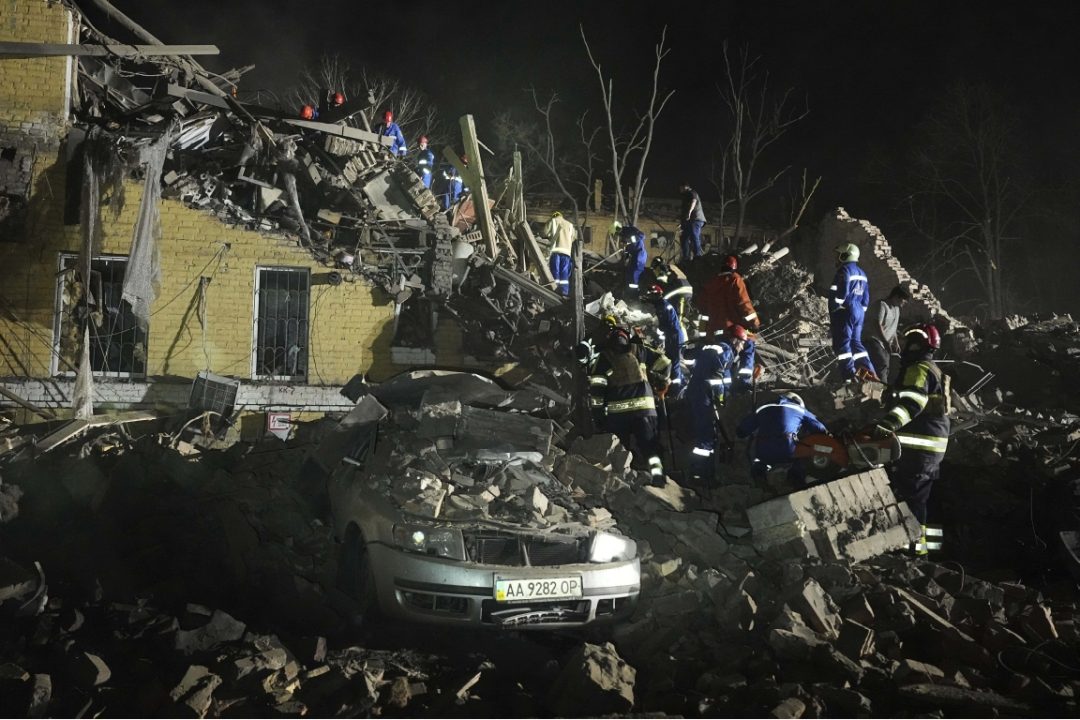
Russia launched a missile and drone attack Wednesday night into Thursday morning that killed 12 people and injured 90 more in Kyiv, according to Ukraine’s air force. Moscow launched the strike hours after Ukrainian President Volodymyr Zelensky rejected a U.S. peace proposal that reportedly included acceptance of Russia’s 2014 annexation of Crimea.
Zelensky said of the proposal, “Ukraine will not legally recognize the occupation of Crimea. nothing to talk about here. This is against our constitution.”
Recognize it or not, Russia is in control of Crimea and it has been for a decade. Moreover, three years after invading it, Russia controls Ukraine’s eastern border regions. And given Ukraine’s manpower problem and its reliance on the United States and Western European nations for everything but its aforementioned dwindling manpower, Russia smells blood in the water.
Please Stop
President Donald Trump reacted to the strikes by chastising Russian President Vladimir Putin on social media and asking him to stop. He wrote on Truth Social:
I am not happy with the Russian strikes on KYIV. Not necessary, and very bad timing. Vladimir, STOP! 5000 soldiers a week are dying. Lets get the Peace Deal DONE!
The United States has proposed a peace deal that would allow Russia to keep most of the territory it has taken since February 2022, and Ukraine would have to give up aspirations to join the North Atlantic Treaty Organization (NATO). Ukraine’s Parliament passed legislation in 2019 to codify the pursuit of NATO membership. But Russia sees NATO as a hostile military alliance and has made it clear for many years that it will not accept Ukrainian entrance into NATO. American foreign-policy experts, including Jeffrey Sachs and U.S. diplomat George Kennan, who authored the U.S. policy of containment of the Soviet Union back in 1947, have warned the NATO issue could lead to big problems. You can read more about that here.
The general view in the West is that Ukraine is being asked to make all the concessions. When a reporter asked Trump during a meeting with Norwegian Prime Minister Jonas Gahr Store what concessions Putin has made, he said, “Stopping the war, stopping from taking the whole country, pretty big concession.”
Russian Nuclear Response
After the strikes, Russia broadcast fresh threats through its state media organ RT. On Thursday, RT published a piece titled, “Western aggression could trigger Russian nuclear response — security chief.” Russian National Security Council Secretary Sergey Shoigu said Moscow reserves the right to launch a nuclear strike in response to Western military aggression. The threat was a response to “discussions in Western Europe about a possible deployment of troops to Ukraine as part of a potential peace deal, as well the EU’s plan to re-militarize the bloc.” Shoigu said Moscow is “closely monitoring the military preparations of the EU countries” and that nuclear weapons may be used “in the event of aggression” against Russia or Belarus. Moreover, he warned of a war between Russia and NATO:
The presence of foreign troops in Ukraine could provoke a direct confrontation between Russia and NATO, potentially escalating into a nuclear war.
European Rearmament
European leaders have talked about stationing peacekeeping troops in Ukraine to prevent future Russian aggression. And now that the United States will no longer subsidize Europe’s security, the continent’s nations have already begun building up their armaments. Early this month, Ukraine’s European allies pledged $24 billion in new military support. In March, 27 European leaders signed off on a plan to increase defense spending. The plan would put about 150 billion euros from the European Union’s unused funds toward military purchases. Germany has also vowed to lift fiscal restrictions as part of efforts to rearm.
Nordic countries are pooling together their resources to shore up the capabilities to stave off a potential attack from Russia. In February, Denmark decided to raise military spending by 70 percent over the next two years. Its special forces have decades of experience deploying to parts of Afghanistan and Iraq. Denmark is combining its power with Sweden, Finland, and Norway to forge a regional security coalition. As reported by The Wall Street Journal, Sweden has an advanced defense industry that makes submarines, battle tanks, and supersonic jet fighters; Norway brings maritime surveillance and fighting capabilities in the Arctic; and Finland has one of the largest standing armies and artillery forces per capita in Europe.
“Russian Threat”
From where the Russians stand, this is turning Europe into a “source of global risk.” As Timofey Bordachev writes at RT:
Today, facing its own developmental dead ends, Western Europe once again turns outward in search of a scapegoat. This time, the preferred solution is militarization, supposedly to counter a “Russian threat.”
The irony is obvious. The EU’s grand vision of integration is in disarray. Its socio-economic models are faltering. Britain, now outside the bloc, is no better off.Aging populations, failing welfare systems, and uncontrolled migration are stoking nationalist sentiments and pushing elites toward more radical postures. Finland, once neutral and pragmatic, now also leans into anti-Russian rhetoric to mask its growing internal malaise.
Related articles
Americans Abandon Russia-Ukraine Peace Talks in London
Trump Ready to Walk Away if Russia and Ukraine Don’t Reach Peace Deal Soon
Europe Agrees to Military Buildup, Germany to Boost Defense Spending





